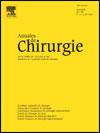Résection vertébrale monobloc pour cancer pulmonaire : 12 ans d'expérience - 22/12/06
 , C. Mazel b, D. Grunenwald c
, C. Mazel b, D. Grunenwald cRésumé |
Objectifs |
Rapporter une étude rétrospective monocentrique de résection vertébrale monobloc pour cancer bronchopulmonaire. Des données de survie à long terme nous permettent de préciser les facteurs pronostiques.
Matériel et methode |
De 1993 à 2004, 32 malades ont été opérés d'un cancer bronchopulmonaire par résection vertébrale monobloc. Vingt-et-un patients avaient reçu un traitement d'induction (16 fois une chimiothérapie, une fois une radiothérapie et quatre fois une association radiothérapie et chimiothérapie). Vingt-six patients ont eu une lobectomie, trois une pneumonectomie et trois une exérèse atypique. Six vertébrectomies totales et 26 partielles ont été réalisées. Les malades se répartissaient en neuf stades IIb, deux stades IIIa et 21 stades IIIb.
Résultats |
Aucune mortalité opératoire n'a été observée. Dix patients (31 %) ont eu des complications majeures ; dont quatre spinales. Une résection complète a été obtenue 28 fois (87 %). Il y a eu dix récidives locales (31 %). La survie globale à deux ans était de 65 %, à cinq ans de 24 % (médiane 32 mois). En analyse univariée deux facteurs influençaient favorablement la survie : le caractère complet de l'exérèse (p=0,01) et la réalisation d'une chimiothérapie d'induction (p=0,04).
Conclusion |
La résection monobloc avec vertébrectomie pour cancer bronchopulmonaire est une intervention difficile grevée d'une lourde morbidité. Des taux de survie à long terme encourageants font considérer cette chirurgie comme une option thérapeutique pour le traitement des cancers pulmonaires localement avancés.
Il testo completo di questo articolo è disponibile in PDF.Abstract |
Objectives |
To report a single-institution retrospective study of radical en bloc resection for lung cancer invading the spine.
Methods |
Between 1993 and 2004, 32 patients underwent partial or total vertebrectomy for non-small cells lung cancer with spinal extension. Twenty-one received induction treatment (chemotherapy, N=16; radiation, N=1 and chemoradiotherapy, N=4). Pneumonectomy was performed in 3 patients, lobectomy in 26 patients and wedge resection in 3 patients. Partial vertebrectomy was performed in 26 patients and total vertebrectomy was performed in 6 patients. Tumor stage was IIb in 9 patients, IIIa in 2 patients and IIIb in 21 patients.
Results |
There was no immediate postoperative mortality. Major morbidity was observed in 10 patients (31%), including 4 complications related to spinal surgery. For 28 patients, a completed resection was achieved (87%). 2-years survival was 65% and 5-years survival was 24%. Completed resection and induction chemotherapy appear to be determinant prognostics factors (respectively p=0,01 and p=0,04 in univariate analysis).
Conclusion |
Radical en bloc resection with vertebrectomy for lung cancer is technically demanding. Encouraging long-term survival suggest that this surgical approach could be a valid option for selected patients with vertebral involvement of lung cancer.
Il testo completo di questo articolo è disponibile in PDF.Mots clés : Cancer bronchopulmonaire, Envahissement vertébral, Cancer localement avancé, Tumeur de Pancoast, Vertébrectomies
Keywords : Lung cancer, Vertebral involvement, Locally advanced cancer, Pancoast's tumor, Vertebrectomy
Mappa
Vol 131 - N° 10
P. 616-622 - Dicembre 2006 Ritorno al numeroBenvenuto su EM|consulte, il riferimento dei professionisti della salute.

